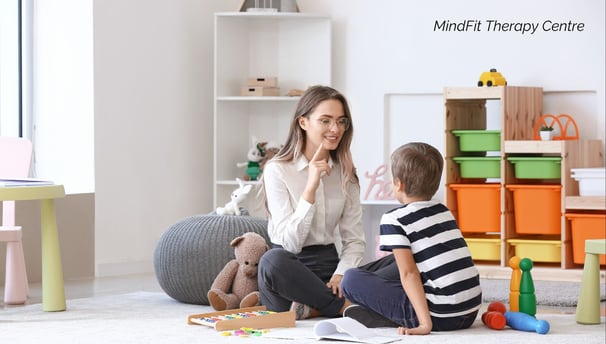Best Autism Centre in Gujranwala! Best Speech Centre in Gujranwala!
Best Therapy Centre in Gujranwala! Book a Free Consultation at MindFit Therapy Centre Today!
Autism Spectrum Disorder (ASD)
Autism is a neurodevelopmental disorder that affects social interaction, communication, and behavior.
Symptoms of Autism
Communication Challenges:
Delayed speech and language development
Difficulty understanding non-verbal cues (gestures, facial expressions)
Echolalia (repeating words or phrases)
Limited use of gestures or facial expressions to communicate
Difficulty initiating or maintaining conversations
Social Interaction Difficulties:
Difficulty making eye contact
Trouble understanding social norms and cues
Lack of interest in peers or difficulty forming friendships
Prefers solitary play over group activities
Difficulty understanding the emotions of others
Repetitive Behaviors:
Repetitive movements such as hand-flapping, *hand-tapping, and **rocking*
Rigid adherence to routines and difficulty with change
Obsession with specific objects or topics
Repeatedly lining up or arranging objects
Sensory Processing Differences:
Auditory Seekers:
Vocal stimming (repeating sounds, humming)
Making loud noises or seeking environments with strong sounds
Auditory Avoiders:
Covering ears to block out loud or high-pitched noises
Becoming distressed by everyday sounds (vacuum cleaners, alarms)
Visual Seekers:
Fascination with moving objects (spinning wheels, ceiling fans)
Eye-gazing (staring at lights, flickering objects)
Fixating on specific patterns, colors, or objects
Visual Avoiders:
May become overwhelmed by brightly lit or chaotic visual environments
Difficulty with bright or flashing lights
Tactile Processing Issues:
Tactile Seekers:
Constantly touching different textures or surfaces
Seeking physical contact, such as hugging others frequently
Always needing to hold objects in their hands (fidgeting)
Tactile Avoiders:
Avoidance of certain textures (refusing to wear certain clothes, avoiding sand or dirt)
Discomfort when touched, even in casual social situations
Difficulty with grooming activities like brushing teeth or hair due to texture sensitivity
Proprioceptive Sensory Challenges:
Proprioceptive Seekers:
Always in motion, constantly jumping, running, or climbing
Enjoys pushing, pulling, or heavy lifting (craving deep pressure)
May hit or crash into things intentionally
Difficulty with body awareness (may seem clumsy or uncoordinated)
Vestibular Processing Challenges:
Seeking spinning or swinging movements (enjoys swings or merry-go-rounds)
Trouble with balance and coordination
Discomfort with sudden changes in position or movements
Additional Symptoms:
Toe-Walking: Often seen in more extreme cases, where the child may habitually walk on their toes.
Mouthing: Frequently putting non-food objects into their mouth, even beyond the typical age.
Aggression or Self-Injury: Some children may exhibit aggression or self-harm (biting, head-banging) when overwhelmed or frustrated.
Limited or Repetitive Play: Playing with toys in the same way repeatedly (e.g., spinning wheels, lining up objects)
Difficulty with Transitions: Struggles when transitioning between activities or locations, often needing extra time or preparation.
Unusual Eating Habits: Picky eating, restricted diets, or refusal to eat foods of specific textures or colors.
Hyper- or Hypo-reactivity to Sensory Input: Sensitivity or under-sensitivity to sounds, lights, textures, smells, or temperature.
Difficulty with Motor Coordination: Challenges with both fine and gross motor skills, such as using utensils, catching a ball, or writing.
Therapies for Autism
- Speech Therapy: Focuses on improving communication skills, both verbal and non-verbal, including alternative communication methods.
- Occupational Therapy (OT): Helps with sensory processing issues, fine and gross motor skills, and daily living activities.
- Behavioral Therapy (ABA): Works on reducing challenging behaviors and enhancing social and learning skills.


Find us at
236 B, Model Town, Gujranwala, Punjab, PAKISTAN
Working Hours
Monday - Friday: 9:00 AM - 5:00 PM
Saturday & Sunday: Closed
admin@mindfit.site
© 2024 Mindfit Therapy Centre. All rights reserved.
Backside Sapphire outlet, Fazal Centre, Rahwali Cantt
